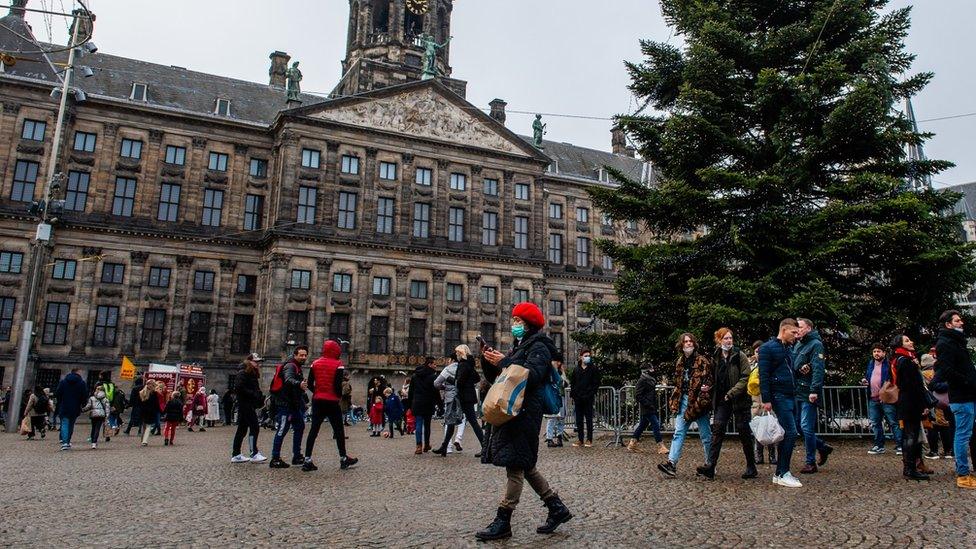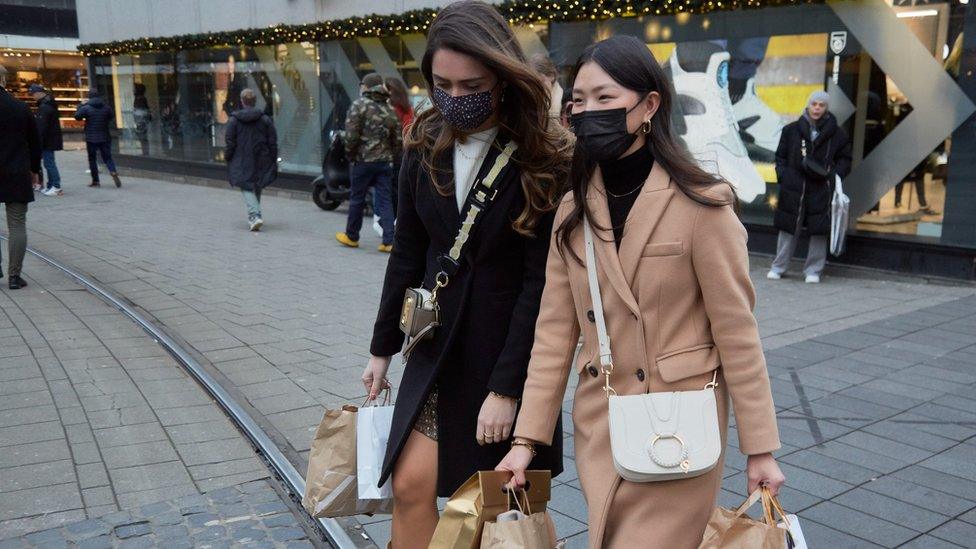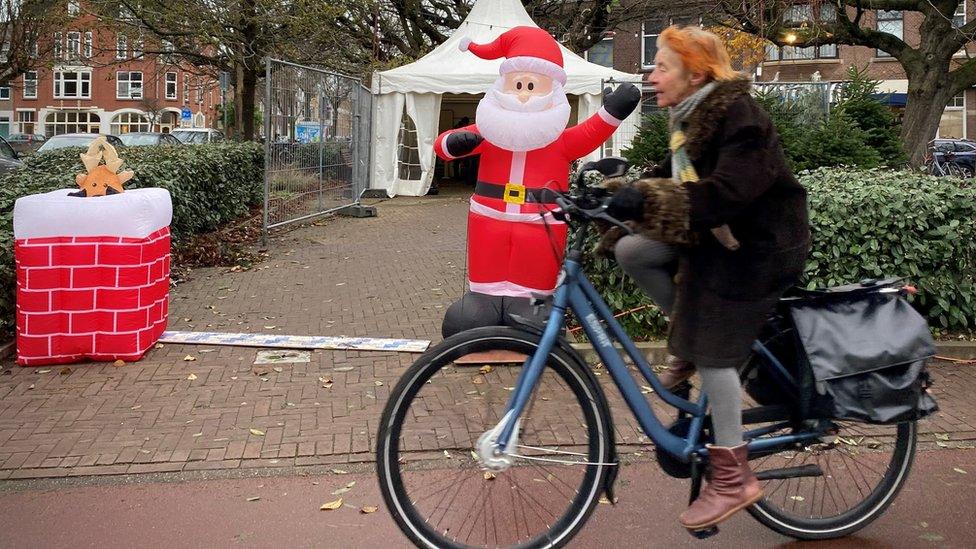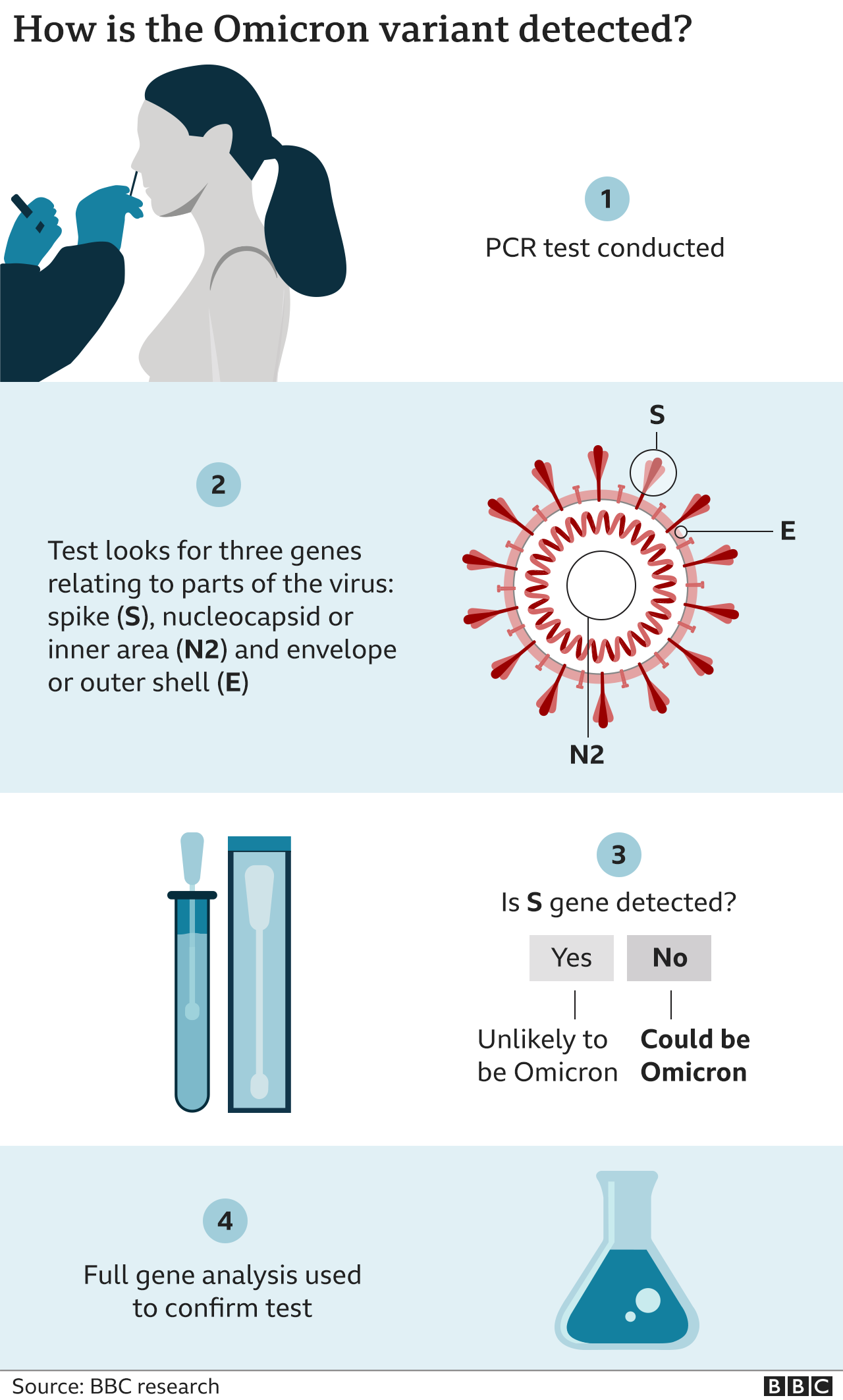Covid: Dutch go into Christmas lockdown over Omicron wave
- Published

People went shopping on Saturday before the lockdown was announced
The Netherlands has begun a strict lockdown over Christmas amid concerns over the Omicron coronavirus variant.
Non-essential shops, bars, gyms, hairdressers and other public venues are closed until at least 14 January. Two guests per household will be allowed - four over the holidays.
Prime Minister Mark Rutte said the measures were "unavoidable".
Countries across Europe have been tightening restrictions as the heavily mutated variant spreads.
The new rules in the Netherlands are the strictest to have been announced over Omicron so far.
"I stand here tonight in a sombre mood. And a lot of people watching will feel that way too," Mr Rutte told a news conference on Saturday. "To sum it up in one sentence, the Netherlands will go back into lockdown from tomorrow."
Under the new restrictions,, external people are being urged to stay at home as much as possible.
There are strict limits on the number of people who can meet. A maximum of two guests, aged 13 and over, are allowed in people's homes. This will rise to four people between 24 and 26 December, and on New Year's Eve and New Year's Day.
Events are not permitted other than funerals, weekly markets selling groceries and professional sports matches with no spectators.
Restaurants can continue to sell takeaway meals, and non-essential shops can offer click and collect services.
Meanwhile all schools are now closed until at least 9 January.
"I can now hear the whole of the Netherlands sighing. This is exactly one week before Christmas, another Christmas that is completely different from what we would like," Mr Rutte said.

During the lockdown, two guests per household will be allowed - four over the holidays
But, he added, a failure to act now would likely lead to "an unmanageable situation in hospitals".

Quiet streets, wasted fresh produce

Larger than life, inflatable Santas bob outside a Christmas tree stall - enticing customers into one of the few places that's allowed to keep serving under lockdown.
Strangers wander down virtually silent high streets, in a wholly locked down society.
Last Christmas the Dutch thought Covid would be under control by now.
Window shopping students responded to the closure of bars, restaurants and all non-essential shops with frustration, and resignation. It feels like a really bad deja vu one told me. His girlfriend is finding it difficult to accept the pause in what would normally be a packed festive calendar.
George, a chef in The Hague, told me he would be going into work tomorrow but only to throw away all the fresh food they were planning to serve customers during what's traditionally their busiest time of the year.
The Dutch prime minister described this lockdown as an "unavoidable" response to Omicron. But the government's critics contend the current crisis is partly of the ministers' own making, citing what was perceived by some as a clumsy handling of the Delta strain and relatively slow rollout of the booster vaccination programme. The over-60s have only just been invited to get their extra shots.
Across Europe this Christmas, coming together, is becoming harder, and riskier, than anyone would have wished.


For weeks, curfews have been placed on hospitality and cultural venues in the Netherlands in an effort to limit the spread of Omicron.
The Dutch National Institute for Public Health has reported more than 2.9 million coronavirus cases since the pandemic began, and over 20,000 deaths.
It says the Omicron variant currently still accounts for a minority of coronavirus cases in the Netherlands, but is spreading rapidly.
Officials say it is expected to become the dominant variant by the New Year.
The head of the Dutch outbreak management team, Jaap van Dissel, said the new measures would "buy time", allowing more people to get booster shots and for the healthcare system to prepare for a possible rise in infections.
Watch time-lapse footage showing the long Eurostar queue at London's St Pancras station on 17 December
"As a country we are best protected if as many people as possible get a booster vaccination," he said.
More than 85% of all adults in the Netherlands have been vaccinated, but so far fewer than 9% have had the booster shot.
Health Minister Hugo de Jonge said all adults would now get an invitation for a booster appointment by 7 January.
Several other European countries have also announced measures designed to curb the infections.
France has imposed strict travel restrictions on those entering from the UK - the hardest hit country in the region, with nearly 25,000 confirmed Omicron cases on Saturday.
From 23:00 GMT on Sunday, Germany will also ban British tourists and business travellers from entering the country.
Europe has already seen more than 89 million cases and 1.5 million Covid-related deaths, according to the latest EU figures.

